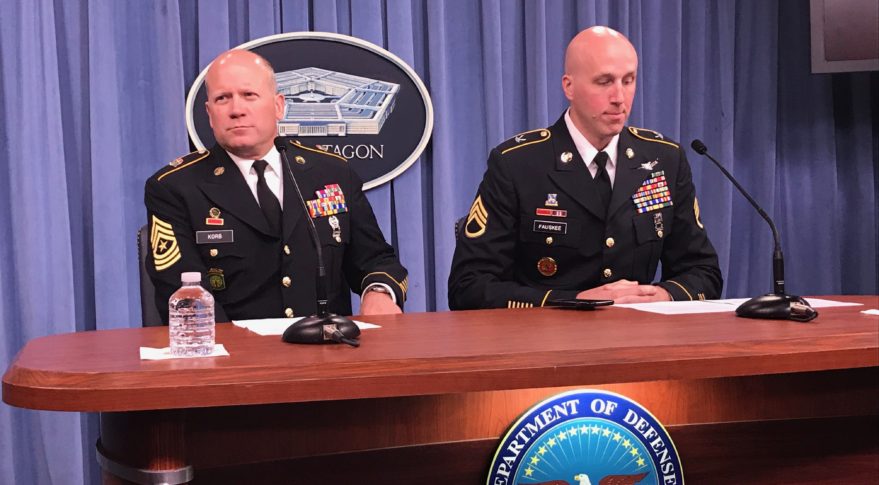Army Soldiers on the Front Lines of Space Wars

WASHINGTON — Soldiers from a Colorado National Guard space battalion who visited the Pentagon on Sept. 5 said they have no idea what role, if any, they would have in the Space Force that President Trump has proposed.
But they did provide a glimpse into the daily grind of space warfare.
When they are called up for duty, soldiers from the 117th Space Battalion go to war zones to help commanders on the ground get what they need from space: satellite imagery, weather analysis, early warning of a missile launch, communications and navigation. [Trump's Space Force Plan Revealed by VP Mike Pence]
"The support teams are critical to success on the battlefield," said Colorado Army National Guard Sgt. Maj. Fred Korb.
A space team includes six soldiers — two officers and four enlisted service members. "They advise tactical units on how to better employ their assigned space-enabled equipment, such as precision-guided weapons systems, navigation equipment and communication systems," Korb told reporters at the Pentagon.
Warnings from military and intelligence agencies about Russia and China threatening to take down or jam U.S. satellites are taken seriously by the Army as forces have grown heavily dependent on satellites. A typical combat brigade has about 3,200 devices that can't function without GPS signals and approximately 300 satellite-based communications devices.
"Yeah, space is definitely an open and available asset — to anyone," said Staff Sgt. Joseph Fauskee, an intelligence officer in charge of one of the Army's space support teams of the 117th Space Battalion. Two of his four overseas deployments were in Afghanistan.
Breaking space news, the latest updates on rocket launches, skywatching events and more!
"So much of today's combat, just like so much of today's life here in the United States, is reliant on assets currently in space," he said. China and Russia are "definitely involved in space operations as much as we are, and they have a vested interest in it," he said. "We have to be very deliberate with how we conduct space operations and take those countries into consideration as we conduct operations."
The 117th Space Battalion — one of two space battalions in the Army — was stood up in 2007, the same year China shocked the world when it fired a missile into space and blew up one of its own satellites.
When an Army space team deploys, it is assigned to a division headquarters. One of its responsibilities is to educate the infantry battalion, the heavy weapons company, and some of the other companies about the space domain and the assets that the military has available in space, said Korb. The division staff has to understand "what they have access to and how to best utilize that."
Over time, "everyone is starting to really grasp that the space domain is something that we have to be proficient in," said Korb.
He noted that Army divisions deploy with Air Force liaison officers to make sure commanders can get access to additional satellite capacity if needed. The Air Force operates 77 satellites in support of the military.
With the growth in commercial remote sensing services, the Army increasingly is buying imagery online from private companies, said Fauskee. In overseas deployments when the Army works with host nations and other non-U.S. allies, the preference is to use unclassified commercial imagery. The U.S. military also relies on host nations for satellite communications bandwidth.
Fauskee said space services from the private sector are comparable those provided by government-owned satellites. "Typically we don't really see a difference in response time or quality of product."
What about the Space Force?
Several reporters pressed Korb and Fauskee for insights into how soldiers really feel about the possibility of being moved to a different service if the Space Force does come to fruition.
A Colorado National Guard spokesman insisted that this was an issue they were not there to discuss.
Korb however reminded reporters that soldiers follow orders. "If the Commander in Chief and the Secretary of Defense decided that the Space Force is the right direction for this country to go, they'll come down and tell us what our role is and we'll execute that role."
Would their jobs change? It's too early to speculate, said Korb. "Quite honestly I really don't know because I don't even think they've come to a point of determining what the Space Force would look like." That said, "I can't imagine [our jobs] changing incredibly too much, because it's about the space-enabled systems that are there and that's the job that we currently do."
Without knowing what the command structure of a Space Force might be, Korb said, "I can't say how we would fit into that or not. But what we do is definitely not going to go away."
This story was provided by SpaceNews, dedicated to covering all aspects of the space industry.

Sandra Erwin covers the military and national security beat as a Senior Staff Writer at SpaceNews. Sandra, based in Arlington, Virginia, specializes in Defense Department and Intelligence Community space programs, policy, budgets, technology and the industry that supports this sector. She joined SpaceNews in October 2017. Before coming to SpaceNews, Erwin covered the U.S. military, the Pentagon, Congress and the defense industry for over two decades as editor of the National Defense Industrial Association's National Defense Magazine and Pentagon correspondent for Real Clear Defense.

